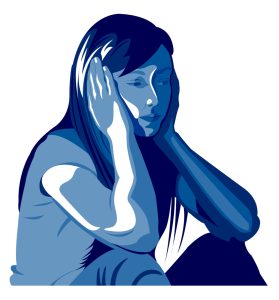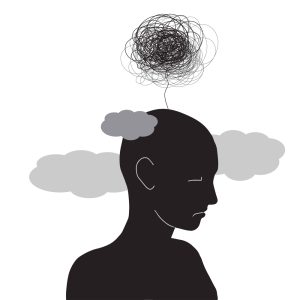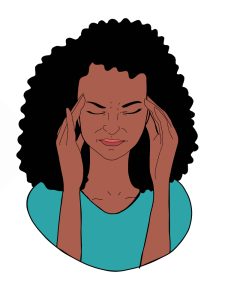Grief effects the whole entirety of the human person. The emotional aftershocks of a loss are so emotionally devastating that the after shocks rock the brain and in turn physically rattle the body. Individuals who lose a person they loved hence experience a total reckoning as the body looks to readjust and recalibrate to the loss itself. When this occurs, the brain itself is rewiring itself with neuro pathways to associate with the loss and initial unprocessed and raw feelings. These raw feelings surge from the amygdala and trigger a variety of neurochemicals within the brain that deal with the loss and pain of someone dying.

Like stress, the flight or fight response is activated which increases the heart rate, raises blood pressure and produces cortisol to deal with the stressful and painful trauma of losing someone. This of course gives more free reign to the amygdala over the reasoning area of the pre-frontal cortex. This is what leads to more emotional outbursts, less reason, less memory, and less concentration itself. In reality, the brain and its entirety of parts is in some way responding to the loss itself.
The article, “How does grief affect the brain?” by Joe Phelan looks at the many issues associated with the brain’s reactions to loss and the after effects upon the human body. The article is strongly based off Lisa Shulman, a Neurologist who studied extensively the effects of grief on the brain. According to Shulman,
“The amygdala [the brain’s center for emotions], deep inside the primitive part of the brain, is always on the lookout for threats,” Shulman said. “When triggered, it sets off a cascade of events that put the entire body on high alert — the heart speeds up, breathing rate increases and blood circulation is increased to the muscles to prepare to fight or flee.”
“How does grief affect the brain?”. Joe Phelan. January 8th, 2023. Live Science
To read the entire article, please click here
Grief Work
Helping the brain heal is what grief work is all about. Grief work helps re-create new neuro pathways that can associate other connections with the deceased that are not only associated with the death itself. The brain, evolutionary, will long the absence of a loved one. This is critical for survival, so naturally it takes time to create new neuro pathways that are beyond simply mourning and trying to find the one who is no longer present. The yearning is a direct result of this and until adaptation manifests and new neuro pathways with new experiences are paved, then one remains in deep grief.

When Pro-Longed Grief occurs or more severe grief due to trauma, complications can occur which can keep the brain trapped in acute grief. The unprocessed and raw emotional pain, similar to memories and sensations in PTSD, are not processed into long term memory. This can lead to longer grieving periods until the information and memory is properly processed, stored and new neuro pathways allow for different connections with the deceased.
It is hence a sad tragedy when grief literally kills one of a broken heart. When things are not processed, adjustments not made, the constant chronic state of fight or flight can produce extra stress on the heart and blood pressure itself.
Reworking Neuro Pathways
Meaning reconstruction is key in helping rework neuro pathways in the brain that associate the loss in a new perspective but also allow memory to properly be processed within the brain. This helps prevent intense emotion that oscillate with more frequency and intensity in the early stages of the brain from continuing to do so many months later. Meaning reconstruction also helps create a new narrative regarding the deceased, re-establishing a new relationship not found in the temporal world. It also helps connect the loss with the present and future, as if chapters within a book. The past chapters of the person’s life and the deep connection with parent or spouse are still integral parts, but those relationships are adjusted and understood in new ways of the person’s next chapters.
Ways to begin to carve out new neuro pathways include journaling and memorializing. Through these two grief works, one is able to remember and honor. The words on paper can help the person adjust and the new memorials can help them cherish the past but also strengthen the bond in its new form. Grief work is tough but throughout, the brain begins to form new connections and grief leaves its acute stage and enters into a far less disruptive force.
Does this mean the loss goes away? The sense of loss never leaves. The connection in the brain and memories can trigger intense emotion, but these triggers are natural and not pathological as in cases of PTSD or depression. As long as love once existed, then the loss will always have meaning and tears can emerge at a moment’s notice. This is not bad but is the result of an emotional scar of losing someone very dear and special. It is to many individuals a sign of their undying love and reminder of the value of the person no longer present.
Conclusion

Grief has a profound effect on the soul, mind and body. It takes time to adjust to it without ever truly healing. However, like all wounds, despite the scar, one heals. Retraining the brain so one can again emotionally function is the aspect of grief work. Adjustment is essential and new neuro pathways are key to that adjustment. With so many false ideas about grief and myths regarding it, individuals can grasp in the chaos of loss longer than they need to. Grief Counselors can help individuals suffering from the trauma of loss and help guide them through the difficult process.
Please also review The American Academy of Grief Counseling’s Grief Counseling Certification and see if it meets your academic and professional goals. The program is online and independent study and open to qualified professionals seeking a four year certification in Grief Counseling.
Bibliography
“How does grief affect the brain?”. Joe Phelan. January 8th, 2023. Live Science
Additional Resources
“How your brain copes with grief, and why it takes time to heal”. Berly McCoy. December 20th, 2021. NPR. Access here
“How grief rewires the brain and can affect health – and what to do about it”. Michael Merschel, March 10th, 2021. The American Heart Association. Access here
“What Does Grief Do to Your Brain?”. Traci Pedersen. May 6th, 2022. Psych Central. Access here
“How Grief Changes the Brain”. Sophia Dembllng. August 18th, 2022. Psychology Today. Access here
